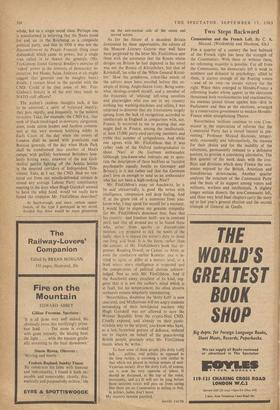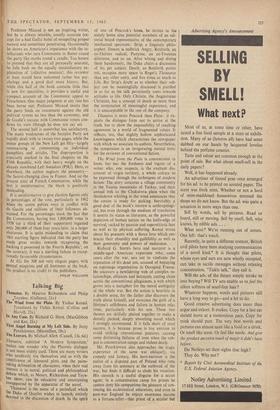Two Steps Backward
Communism and the French Left. By C. A. Micaud. (Weidenfeld and Nicolson, 42s.)
FOR a quarter of a century the best bulwark of the French right has been the strength of the Communists. With them or without them, no reforming majority is possible. Cut off from the Communists, the democratic left is weak in numbers and defeatist in psychology; allied to them, it alarms enough of the floating voters —and of its own—to ensure victory for the right. When there emerged in Mendes-France a reforming leader whose appeal to the electorate threatened both revolutionaries and reactionaries, his enemies joined forces against him—first in Parliament and then at the elections, arranged by a conservative government to weaken Mendes- France while strengthening Thorez.
Nevertheless 'millions continue to vote Com- munist in the expectation of reforms that the Communist Party has a vested interest in pre- venting.' Professor Micaud discusses, temper- ately, reasonably and informatively, the reasons for their choice and for the inability of the reformists, permanently reduced to a defensive posture, to provide a convincing alternative. The first quarter of the book•. deals with the con- flicts and divisions which deny France the con- sensus enjoyed by the British, American and Scandinavian democracies. Another quarter analyses the structure of the Communist Party and the basis of its support among voters and militants, workers and intellectuals. A slightly longer section dissects the non-Communist left, and three very brief final chapters carry the story up to last year's general election and the second triumph of General de Gaulle.
Professor Micaud is not an inspiring writer, but he is always sensible, usually accurate (ex- cept for a bad Gallic habit of misspelling proper names) and sometimes penetrating. Occasionally he shows an American's impatience with the in- tellectuals who turn Communist or flutter round the party like moths round a candle. Too honest to pretend that they are all personally neurotic, he falls back on the equally unsatisfactory ex- planation of 'collective neurosis'; this reviewer at least would have welcomed rather less psy- chology and a good deal more history. But, while this half of the book contains little that is new for specialists, it provides a useful and compact account of the Communist appeal to Frenchmen. One major judgment at any rate has been borne out; Professor Micaud insists that the party feeds on resentment against the old political system no less than the economic, and de Gaulle's success with Communist voters con- firms his view (though he does not say so).
The second half is somewhat less satisfactory. The many weaknesses of the Socialist Party are rapidly dealt with in twenty-two pages, while the minor groups of the New Left get fifty—largely summarising or commenting on individual pamphlets and articles. The disproportion is especially marked in the final chapters on the Fifth Republic, with their heavy weight on the already moribund. Left Socialists (PSU). Here, as elsewhere, the author neglects the peasantry— the fastest-changing class in France. And on-the Present state of French Communism, while the text is uninformative, the blurb is positively. misleading. It is uninformative to give election figures only in percentages of the vote, particularly in 1962 When the centre patties were in conflict with de Gaulle and millions of their followers ab- stained. For the percentages mask the fact that Vise Communists, having lost 1,800,000 votes in 1958 (or a third of their supporters) regained only 200,000 of them four years later, in a larger electorate. It is quite misleading to claim that `this startling figure indicated that the party has made great strides towards recapturing the backing it possessed in the Fourth Republic'; on the contrary, it was a startling failure in excep- tionally favourable circumstances.
At 42s. for 308 not very elegant pages, with several misprints and all footnotes at the back, the product is no credit to the publishers.
PHILIP WILLIAMS































 Previous page
Previous page